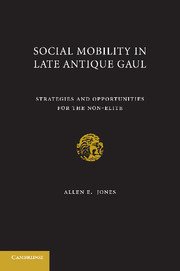Book contents
- Frontmatter
- Contents
- ACKNOWLEDGMENTS
- ABBREVIATIONS
- Gaul in the Late Sixth Century
- CHAPTER ONE INTRODUCTION: BARBARIAN GAUL
- CHAPTER TWO EVIDENCE AND CONTROL
- CHAPTER THREE SOCIAL STRUCTURE I: HIERARCHY, MOBILITY, AND ARISTOCRACIES
- CHAPTER FOUR SOCIAL STRUCTURE II: FREE AND SERVILE RANKS
- CHAPTER FIVE THE PASSIVE POOR: PRISONERS
- CHAPTER SIX THE ACTIVE POOR: PAUPERES AT CHURCH
- CHAPTER SEVEN HEALING AND AUTHORITY I: PHYSICIANS
- CHAPTER EIGHT HEALING AND AUTHORITY II: ENCHANTERS
- CHAPTER NINE CONCLUSION
- BIBLIOGRAPHY
- INDEX
CHAPTER EIGHT - HEALING AND AUTHORITY II: ENCHANTERS
Published online by Cambridge University Press: 18 December 2009
- Frontmatter
- Contents
- ACKNOWLEDGMENTS
- ABBREVIATIONS
- Gaul in the Late Sixth Century
- CHAPTER ONE INTRODUCTION: BARBARIAN GAUL
- CHAPTER TWO EVIDENCE AND CONTROL
- CHAPTER THREE SOCIAL STRUCTURE I: HIERARCHY, MOBILITY, AND ARISTOCRACIES
- CHAPTER FOUR SOCIAL STRUCTURE II: FREE AND SERVILE RANKS
- CHAPTER FIVE THE PASSIVE POOR: PRISONERS
- CHAPTER SIX THE ACTIVE POOR: PAUPERES AT CHURCH
- CHAPTER SEVEN HEALING AND AUTHORITY I: PHYSICIANS
- CHAPTER EIGHT HEALING AND AUTHORITY II: ENCHANTERS
- CHAPTER NINE CONCLUSION
- BIBLIOGRAPHY
- INDEX
Summary
There was in this time a woman possessing the spirit of the python, who generated much [wealth] for her masters by divining [answers] to questions. On account of her service she advanced in their gratitude; she was freed and permitted to act as she pleased. If anyone suffered from theft or some other evil, immediately she would declare where the thief was hiding, to whom he had delivered the goods, or whatever else had transpired. Daily she accumulated gold and silver. She went about bedecked with jewels so that the people thought her something of a goddess.
GREGORY OF TOURS, Historiae 7.44Late Antiquity had no lack of people who claimed an ability to supernaturally secure health, wealth, love, revenge, and hidden knowledge. Such persons predicted future events, elucidated on the past, interpreted dreams, affected weather conditions, healed physical afflictions, caused afflictions, identified this-worldly evildoers, and got rid of otherworldly evildoers. Late ancient magicians were a varied lot: Christian and pagan, clergy and laity, male and female, bishop and slave, philosopher and athlete. While acquisition of wealth and local repute motivated some to contact the supernatural, as apparently was the case for the diviner of this chapter's introductory quote, others claimed such abilities in order to augment their control over society. Practitioners of esoteric arts chanced having to reckon with powerful secular officials and ecclesiastics, but ifthey fared as successfully as the prognosticator described here, then presumably their efforts will have been worth the risk.
- Type
- Chapter
- Information
- Social Mobility in Late Antique GaulStrategies and Opportunities for the Non-Elite, pp. 283 - 335Publisher: Cambridge University PressPrint publication year: 2009



